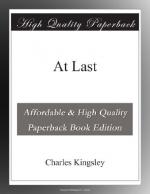Mabel’s husband was not a simpleton, or characterless; but if he had been, his prospetts of success would not have been materially damaged by her knowledge of his deficiencies. A union with him was a safe investment, and must be several degrees more supportable than was her position at Ridgeley, banned by its owner and patronized by his wife. I neither excuse nor blame her for thus deciding and transacting. Should I censure, a majority of my readers—nearly all of the masculine portion—would pick holes in my unpractical philosophy, scout my reasoning as illogical, brand my conclusions as pernicious—winding up their protest with the sigh of the mazed disciples, when stunned by the great Teacher’s deliverance upon the subject of divorce, “If the case of the man be so with his wife, it is not good to marry!”
Which dogma I likewise decline to dispute—falling back thankfully upon the blessed stronghold of unambitious story-tellers—namely, that my vocation is to describe what is—not make fancy-sketches of millennial days, when rectitude shall be the best, because most remunerative policy; when sincerity shall be wisdom—proven and indisputable, and consistency the rule of human faith and practice the world over, instead of being, as it now is, one of the lost (or never invented) fine arts.
CHAPTER XIII.
Julius Lennox.
“You are puttin’ your eyes out, workin’ so stiddy, honey, and it’s gettin’ dark.”
Mabel aroused herself from her intent attitude, and looked at the window. There was a brassy glimmer in the cloudy west; the rest of the sky was covered by thick vapors.
“The days are still very short,” she said, folding her work, and becoming aware that her eyes ached from long and close study of the intricate pattern.
It was Mammy Phillis who had interrupted her reverie, and she now laid an armful of seasoned hickory wood upon the hearth, and set herself about mending the fire, taking up the ashes which had accumulated since morning, putting the charred sticks together, and collecting the embers into a compact bed.
“We’re goin’ to have fallin’ weather ’fore long,” she observed, oracularly. “The wind has changed since dinner, and when the wind whirls about on a sudden, we upon this ridge is the fust to find it out. I must see that them lazy chil’len, Lena and Lizy, fills your wood-box to-night with dry wood; I’d be loth to have you ketch cold while you are here.”
“You are very good, Mammy, but why do you trouble yourself to attend to my fire? You should have sent up Lena with that great load of logs.”
“I ain’t easy without I see to you myself, at least once a day. It ’minds me of the good ole times to wait upon you. O, Lord! how long?” shaking her tartan turban with a portentous groan, her chin almost scraping the hearth, as she stooped to blow into the crater of fiery coals.




